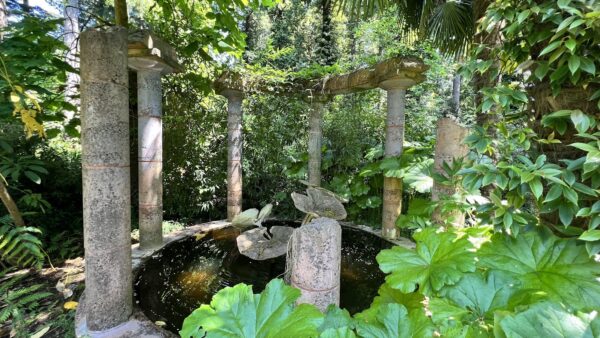Blossoming Splendor: Exploring the Wonders of Heronswood Garden
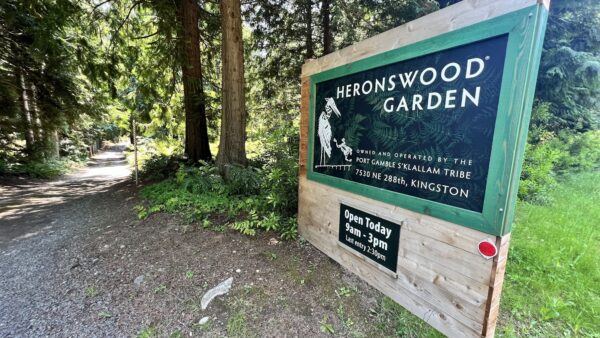
Nestled in the picturesque landscape of Kingston, Washington, Heronswood Garden stands as a botanical haven, captivating visitors with its diverse collection of rare and exotic plants. As one strolls through the meticulously curated pathways, a symphony of colors and textures unfolds, showcasing the garden's commitment to plant exploration and conservation.
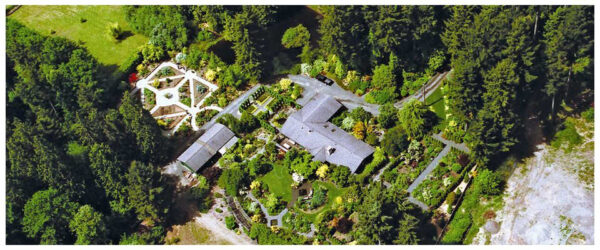
History
Heronswood's history traces back to 1987 when it was founded by Dan Hinkley (horticulturist) and Robert L. Jones (architect) when they purchased the property, initially envisioning it as their private garden. However, driven by a shared love for plants, especially rare and unusual ones, they soon realized the potential of Heronswood as a place to showcase the diversity of the plant kingdom. They originally launched Heronswood as a mail order nursery. Robert designed the layout, hardscape and structures of the garden, as well as the heron and frog logo.
The founders embarked on numerous (35) plant-hunting expeditions around the world, seeking out unique and rare specimens to introduce to Heronswood. These botanical adventures, spanning Asia, South America, and other continents, contributed to the garden's reputation as a hub for rare and exotic plants. The duo's keen eye for unique botanical finds transformed Heronswood into a living collection of global plant diversity.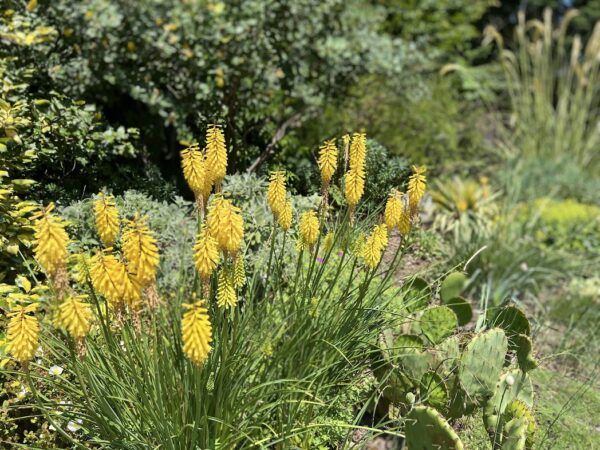
Over the years, Heronswood evolved from a private garden into a horticultural treasure trove open to the public. Its reputation grew as a haven for plant enthusiasts, attracting visitors, researchers, and horticulturists eager to explore the curated collection. The garden's layout and design reflect the founders' commitment to creating an immersive experience that educates and inspires.
As Heronswood gained recognition, it also became a center for plant conservation. The founders actively engaged in seed exchange programs, propagation initiatives, and collaborations with other botanical institutions to contribute to the preservation of endangered species. Heronswood's role as a living laboratory underscores its commitment to not only showcasing rare plants but also actively participating in global efforts to protect plant biodiversity. Heronswood is an internationally recognized treasure in the Pacific Northwest, even garnering the attention of Martha Stewart.
In 2000, Heronswood faced a significant transition. The founders decided to sell the business and property to the W. Atlee Burpee Corporation. In 2006, Burpee abruptly closed the nursery and liquidated or relocated most of the plant materials and fixture and it fell into disuse. Despite this change, the spirit of Heronswood as a botanical gem persevered, with subsequent caretakers continuing the legacy of plant exploration and conservation.
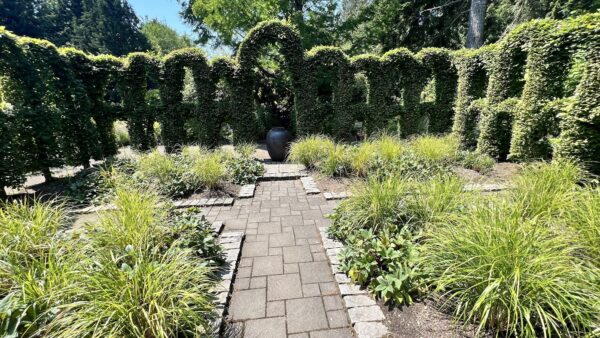
Cultivating Heritage: The Rich Tapestry of Heronswood Garden
In 2012 Heronswood Garden was purchased by the Port Gamble S’Klallam Tribe with the intent of using it as a vehicle to preserve and celebrate tribal culture, to bring their community together, and nurture a sense of protecting the resources around them. It is the only botanical garden in the U.S. owned and maintained by a Native American tribe.
Nestled along the shores of the Salish Sea, the Heronswood Garden stands as a living testament to the enduring connection between the indigenous people of the region and the land they call home. This vibrant and culturally significant garden weaves together a story of heritage, sustainability, and the preservation of traditional knowledge.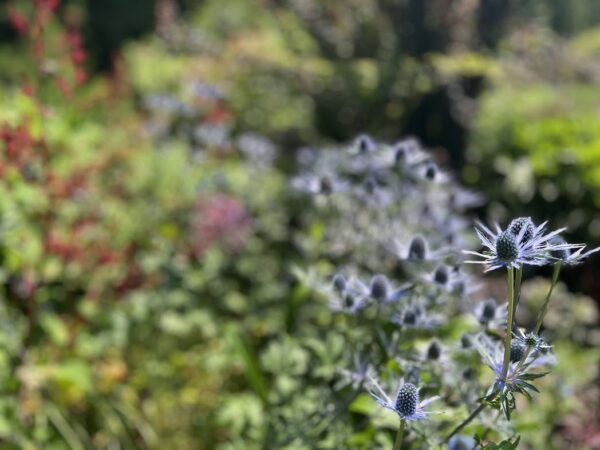
During more than 10 years of ownership, the tribe has expanded the garden from 10 to 15 acres as it moved the facility toward a more significant reflection of tribal culture and values. Today Heronswood is home to a number of tribal cultural artifacts and hosts early childhood, summer youth and re-entry programs for tribal members transitioning out of the criminal justice system. Additionally, its buildings provide space for tribal meetings and offices.
At the Edmonds in Bloom Garden Celebration event 2023, Dr Ross Bayton, Director gave a wonderful presentation on Heronwoods Garden. He said “One of the goals is to reconnect the tribal members — especially the younger ones – with traditional plants that at one time had been part of their culture but over the years have mostly lost that connection.”
He cited the camas plant as an example. 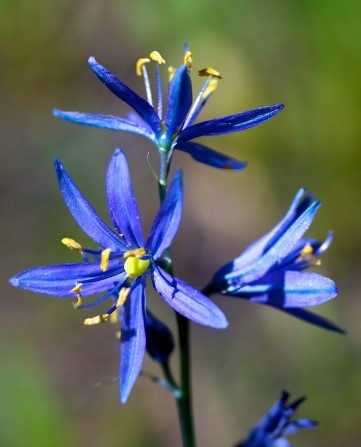
“Significantly, camas was the primary source of carbohydrate for many indigenous people,” he explained. “It was their potatoes, their rice – and sadly most tribal youth have never tasted it. We are now planting camas in the S’Klallam Connections Garden at Heronswood, and we look forward to harvesting, collecting, preparing it.”
Cultivating Roots: A Historical Perspective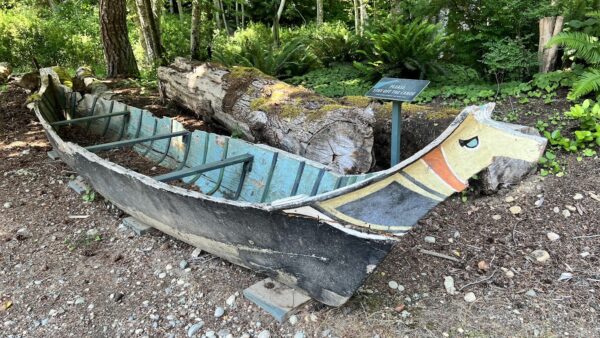
The history of the Port Gamble S'Klallam Tribe is deeply intertwined with the natural bounty of the Pacific Northwest. For generations, this tribe has relied on the rich resources of the land and sea for sustenance and cultural practices. The garden, therefore, becomes a reflection of a timeless relationship with the environment.
A Garden with Purpose
The Heronswood Garden is not just a collection of plants; it is a deliberate and thoughtful space designed to serve multiple purposes. From medicinal plants with healing properties to traditional food crops, every corner of the garden tells a story of sustenance, health, and cultural continuity.
Traditional Ecological Knowledge in Bloom
At the heart of the garden is the wealth of traditional ecological knowledge passed down through generations. Elders and community members actively participate in the cultivation process, sharing wisdom about plant varieties, growing techniques, and the spiritual significance of certain species. The garden, therefore, becomes a dynamic repository of indigenous wisdom.
Nurturing Sustainability
In an era where environmental sustainability is of paramount importance, the Heronswood Garden serves as a model for eco-friendly practices. Embracing organic gardening methods and a deep respect for the natural balance, the garden embodies the tribe's commitment to stewardship of the land.
Community Engagement and Education
The garden is not secluded; it's a community hub where tribal members and visitors alike come together to learn, celebrate, and connect. Workshops, events, and educational programs are hosted regularly, inviting people to engage with the cultural significance of the plants and the traditions they represent.
Challenges and Triumphs
Like any garden, the Heronswood Garden faces challenges. Climate changes, invasive species, and the ever-evolving landscape of conservation present ongoing hurdles. However, the resilience of the tribe and their commitment to preserving their cultural heritage ensure that the garden continues to thrive against the odds.
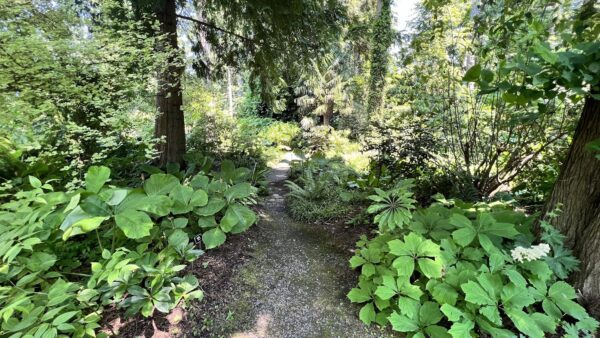
A Visit to Heronswood Garden
See photo album of a July 2023 visit here.
Photo Album of Heronswood Garden here.
As one walks through the Garden, it becomes evident that this is not just a space for growing plants; it's a living legacy. It's a celebration of identity, sustainability, and the profound interconnectedness between people and the land. The garden stands as an invitation to all who visit – an invitation to witness, appreciate, and learn from the rich tapestry of indigenous culture flourishing in every leaf, stem, and root.
Over the years, this garden has evolved into a living testament to their passion for horticulture, drawing plant enthusiasts, researchers, and nature lovers alike. The garden spans over 15 acres, offering an immersive experience that seamlessly blends artistry with ecological preservation.
The collection at Heronswood is nothing short of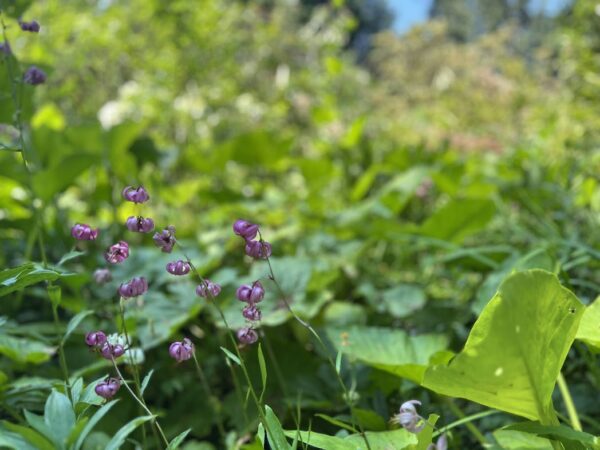 extraordinary. Avid gardeners and botanists will find themselves surrounded by a diverse array of plants, many of which are rare and endangered. From the delicate blooms of rare orchids to towering tree ferns, Heronswood is a treasure trove of botanical wonders, each specimen meticulously labeled to educate and inspire.
extraordinary. Avid gardeners and botanists will find themselves surrounded by a diverse array of plants, many of which are rare and endangered. From the delicate blooms of rare orchids to towering tree ferns, Heronswood is a treasure trove of botanical wonders, each specimen meticulously labeled to educate and inspire.
The layout of Heronswood Garden is a masterpiece in itself, with meandering pathways that lead visitors on a journey of discovery. Every turn reveals a new vignette, a carefully crafted arrangement of plants that showcases the beauty of biodiversity. The garden's design is a testament to its founders' vision of creating a space that not only pleases the senses but also fosters a deeper understanding of the plant kingdom.
Seasonal changes bring a dynamic quality to Heronswood, ensuring that no two visits are the same. Spring bursts forth with a riot of blossoms, while autumn paints the landscape in warm hues. This ever-changing tableau reflects the garden's commitment to sustainability and ecological harmony.
Beyond its aesthetic appeal, Heronswood plays a crucial role in plant conservation. The garden actively participates in seed exchange programs and contributes to the global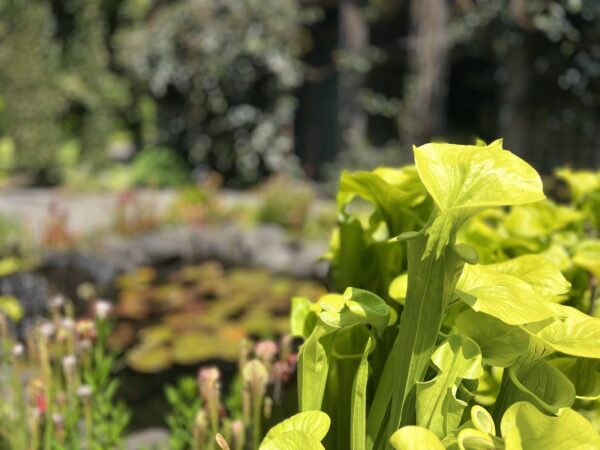 effort to safeguard endangered species. It serves as a living laboratory, where researchers and botanists can study and propagate rare plants, ensuring their survival for generations to come.
effort to safeguard endangered species. It serves as a living laboratory, where researchers and botanists can study and propagate rare plants, ensuring their survival for generations to come.
Today, Heronswood stands as a testament to the vision and dedication of its founders. It remains a place where botanical beauty meets scientific inquiry, welcoming visitors to explore the wonders of the plant kingdom while contributing to the vital mission of preserving our planet's plant diversity. The garden's history is a narrative of passion, exploration, and the enduring legacy of Heronswood as a beacon for plant lovers around the world.
Heronswood is an easy day trip from Edmonds, and visitors are always welcome. The garden is open year-round Wednesday through Sunday in summer, weekends only in winter and holds several events including a summer hydrangea festival, spring and autumn garden sales, and a Halloween Haunted Heronswood. Admission is $10 for adults, $5 for youths, and free to children under 7. Learn more about Heronswood here.
In conclusion, a visit to Heronswood Garden is not just a stroll through a beautiful landscape but a journey into the heart of botanical exploration and conservation. It is a place where nature and human artistry intertwine, creating a sanctuary for plant diversity and a source of inspiration for all who have the privilege of experiencing its wonders.
Videos
Heronswood reborn! Dr. Ross Bayton ( Director of Heronswood) and Debby Purser (from the S'Klallam) talk about the garden and the growing role of the tribe in managing the garden,
